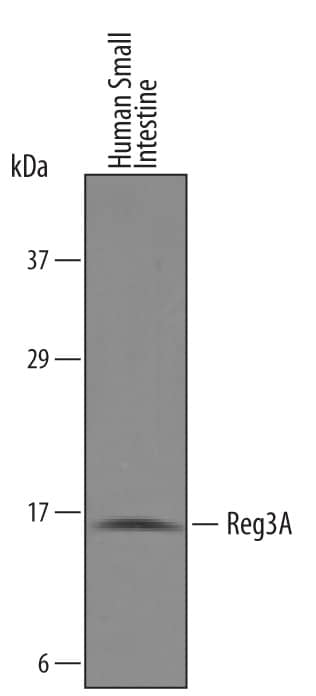Human Reg3A Antibody Summary
Glu27-Asp175
Accession # Q06141
Customers also Viewed
Applications
Please Note: Optimal dilutions should be determined by each laboratory for each application. General Protocols are available in the Technical Information section on our website.
Scientific Data
 View Larger
View Larger
Detection of Human Reg3A by Western Blot. Western blot shows lysates of human small intestine tissue. PVDF membrane was probed with 1 µg/mL of Human Reg3A Antigen Affinity-purified Polyclonal Antibody (Catalog # AF5940) followed by HRP-conjugated Anti-Sheep IgG Secondary Antibody (Catalog # HAF016). A specific band was detected for Reg3A at approximately 17 kDa (as indicated). This experiment was conducted under reducing conditions and using Immunoblot Buffer Group 8.
Preparation and Storage
- 12 months from date of receipt, -20 to -70 °C as supplied.
- 1 month, 2 to 8 °C under sterile conditions after reconstitution.
- 6 months, -20 to -70 °C under sterile conditions after reconstitution.
Background: Reg3A
Reg3A (regenerating gene III alpha ) is a secreted, 17 kDa, type III member of the Reg family, C-type lectin superfamily of proteins. It is expressed in intestine and exocrine pancreas, where it may have a protective effect against infection and TNF-alpha -induced stress. Mature mouse Reg3A is 149 amino acids (aa) in length (aa 27‑175). It is essentially a soluble C-type lectin domain (aa 40‑173). There are four type III genes ( alpha -δ) in the mouse Reg family. Reg3A has less that 60% aa identity to beta -δ. Mature mouse Reg3A is 87% and 61% aa identical to rat and human Reg3A, respectively.
Product Datasheets
FAQs
No product specific FAQs exist for this product, however you may
View all Antibody FAQsIsotype Controls
Reconstitution Buffers
Secondary Antibodies
Reviews for Human Reg3A Antibody
Average Rating: 3.3 (Based on 4 Reviews)
Have you used Human Reg3A Antibody?
Submit a review and receive an Amazon gift card.
$25/€18/£15/$25CAN/¥75 Yuan/¥2500 Yen for a review with an image
$10/€7/£6/$10 CAD/¥70 Yuan/¥1110 Yen for a review without an image
Filter by:
Luminex XMAP Platform to develop a newborn screening test for pancreatitis associated protein, to be evaluated with Immuno-ReativeTrypsin in Cystic Fibrosis screening














